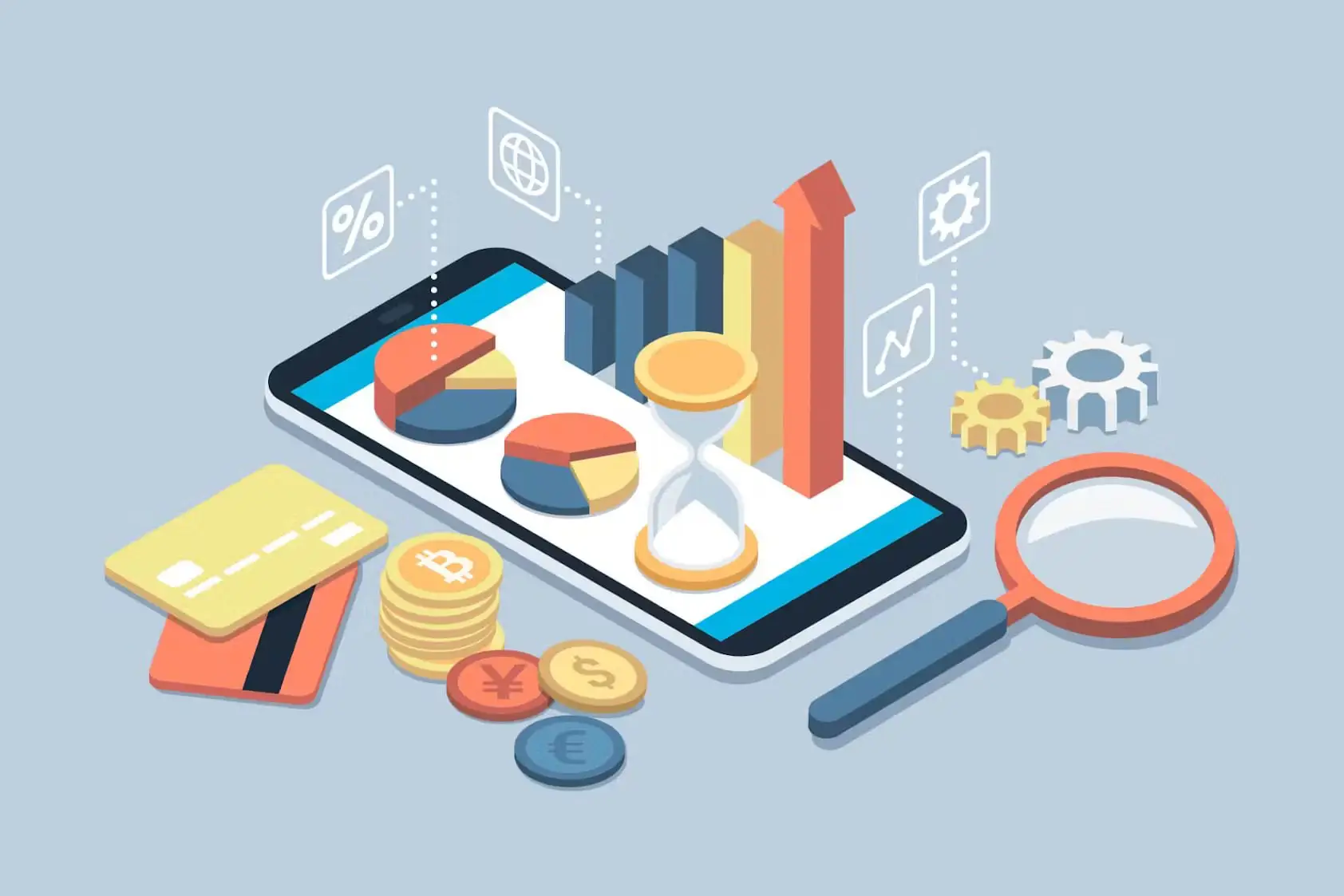The biggest barrier for first-time real estate investors is simple: money. It’s not just finding and obtaining the money needed to buy a property; it’s also knowing how much you’ll need. So how much do you really need to buy a rental property? It might be less than you think.
Let’s break down what you can realistically expect to have on hand, and also show you how to reduce that amount when possible. After that, you can confidently move towards your first investment property with a realistic plan.
So how much money do you need to invest in real estate? And how much does it cost to invest in real estate?
In this article, we’ll explain the 4 major expense categories for your first real estate investment so that you can answer the question “how much money do I need to invest in real estate”. These categories include:
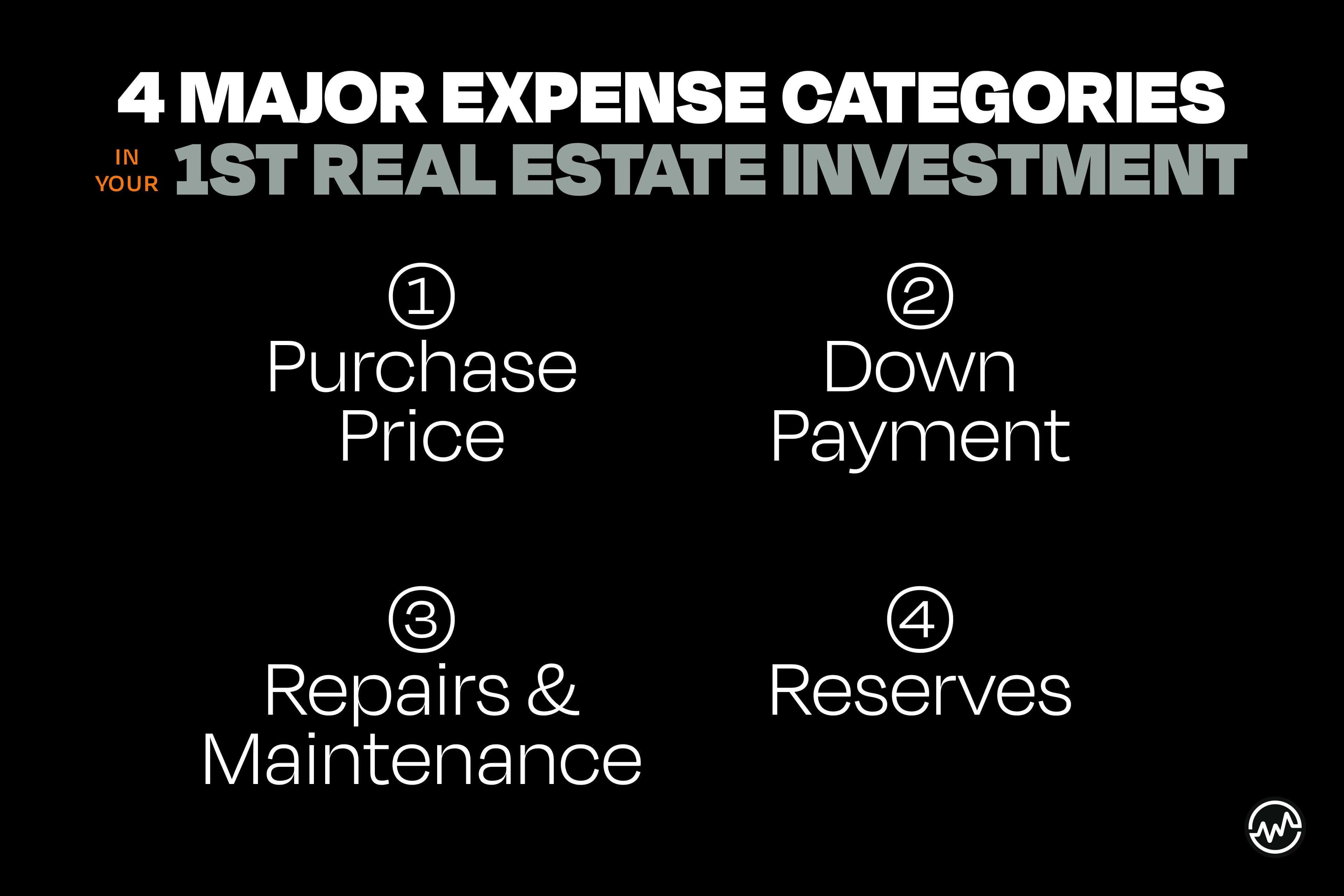
The Purchase Price of Your First Real Estate Investment
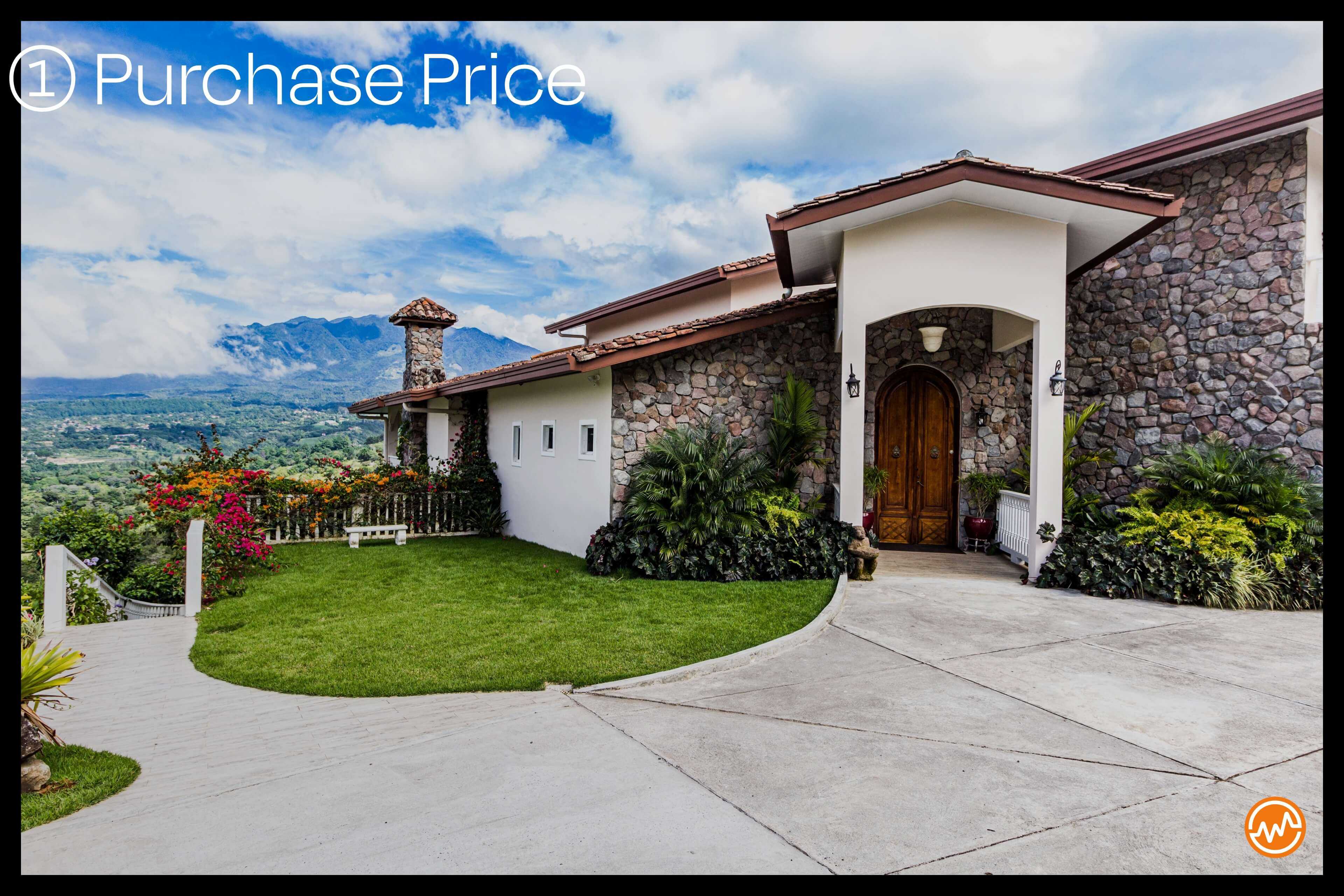
It goes without saying: the lower a property’s price is, the less money you need to buy it.
Yet, people gravitate towards buying rental properties in the same locations and standards they would want to live in personally.
Here’s a crucial tip: What you look for when buying a rental property is not the same as what you look for in your own home.
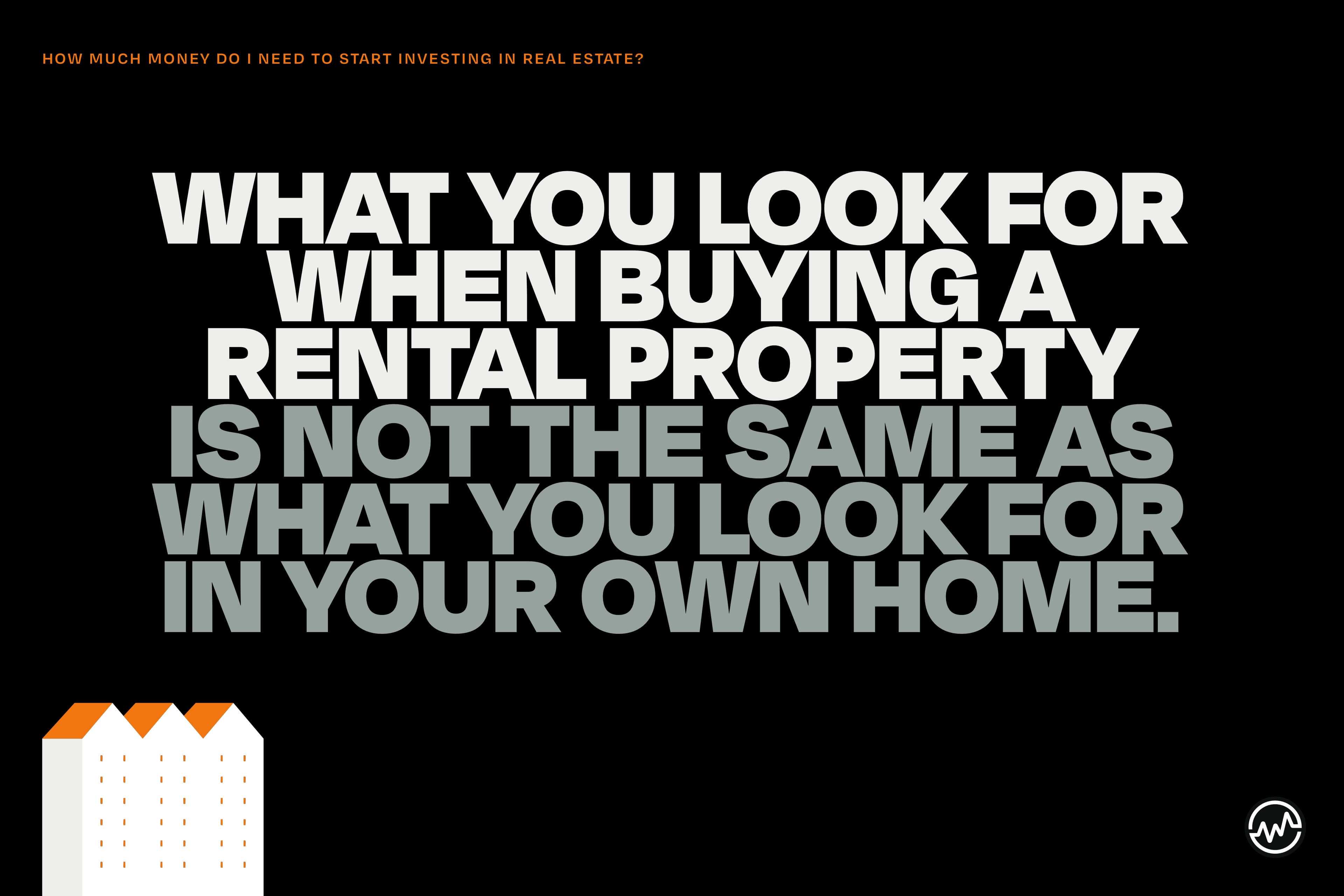
A rental property’s job is not:
- to be close to your work
- be in your preferred school district
- have the fancy granite countertops and wood floors you’ve always wanted
Instead, its job is to make you money. Spending any more than you need to is a waste.
This is hard to get past. Why?
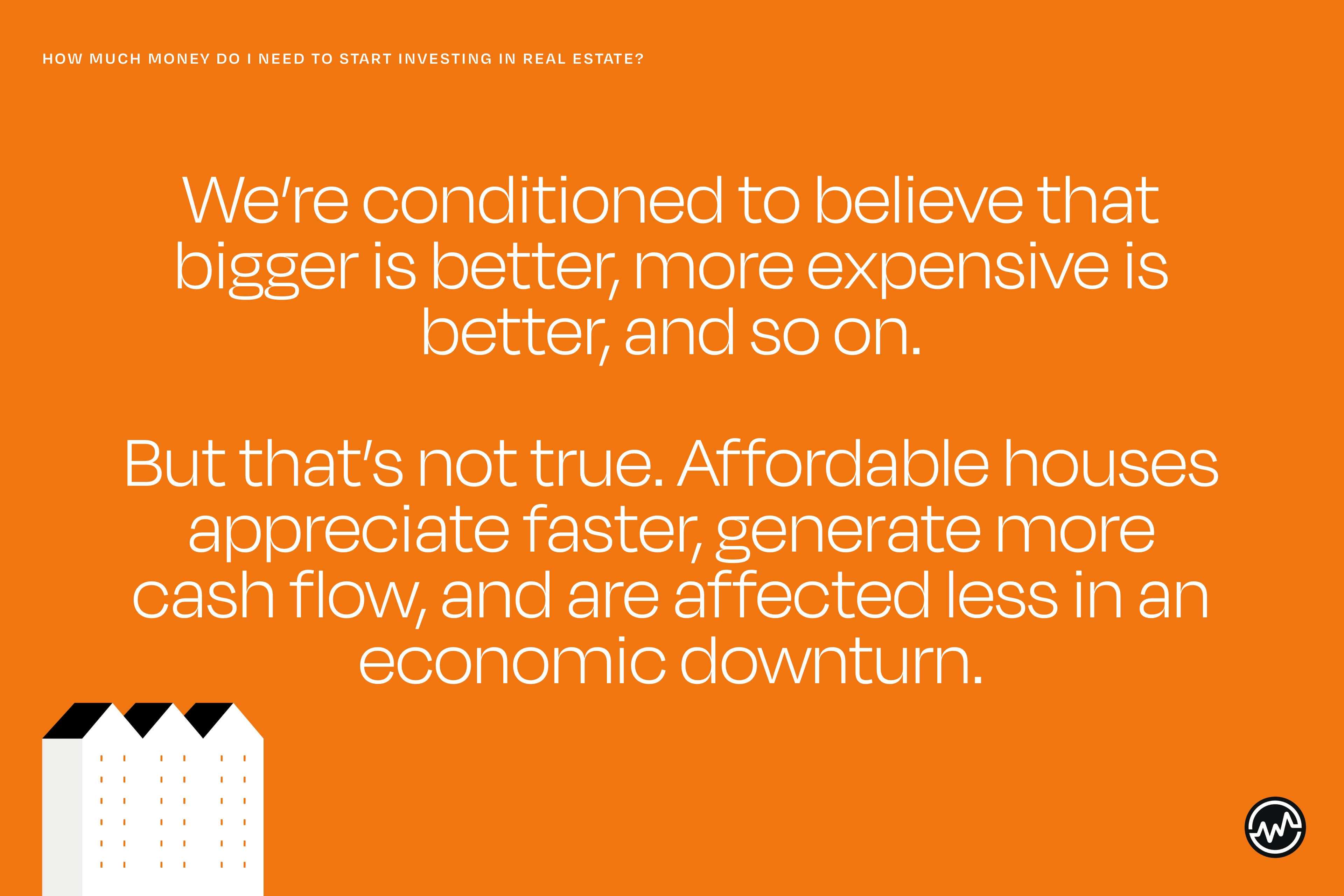
We’re conditioned to believe that bigger is better, more expensive is better, and so on.
But that’s not true. Affordable houses appreciate faster, generate more cash flow, and are affected less in an economic downturn.
It’s true.
Here’s another great perspective for affordable houses: it’s better to own several small houses than one big one.
Why?
It diversifies your risk, and also makes it easier to sell one and not the whole thing in case you need cash.
Some investors’ strategy involves buying two houses, paying down the loans for 15 years, then selling one and using the proceeds to pay off the other.
In this case, you’ve got a free and clear house in half the time with cash flow you can live on.
Although the equity you own is the same, it’s better to own a whole house in 15 years, than half a house.
Here are three simple tips to keep in mind about property prices before we move on:
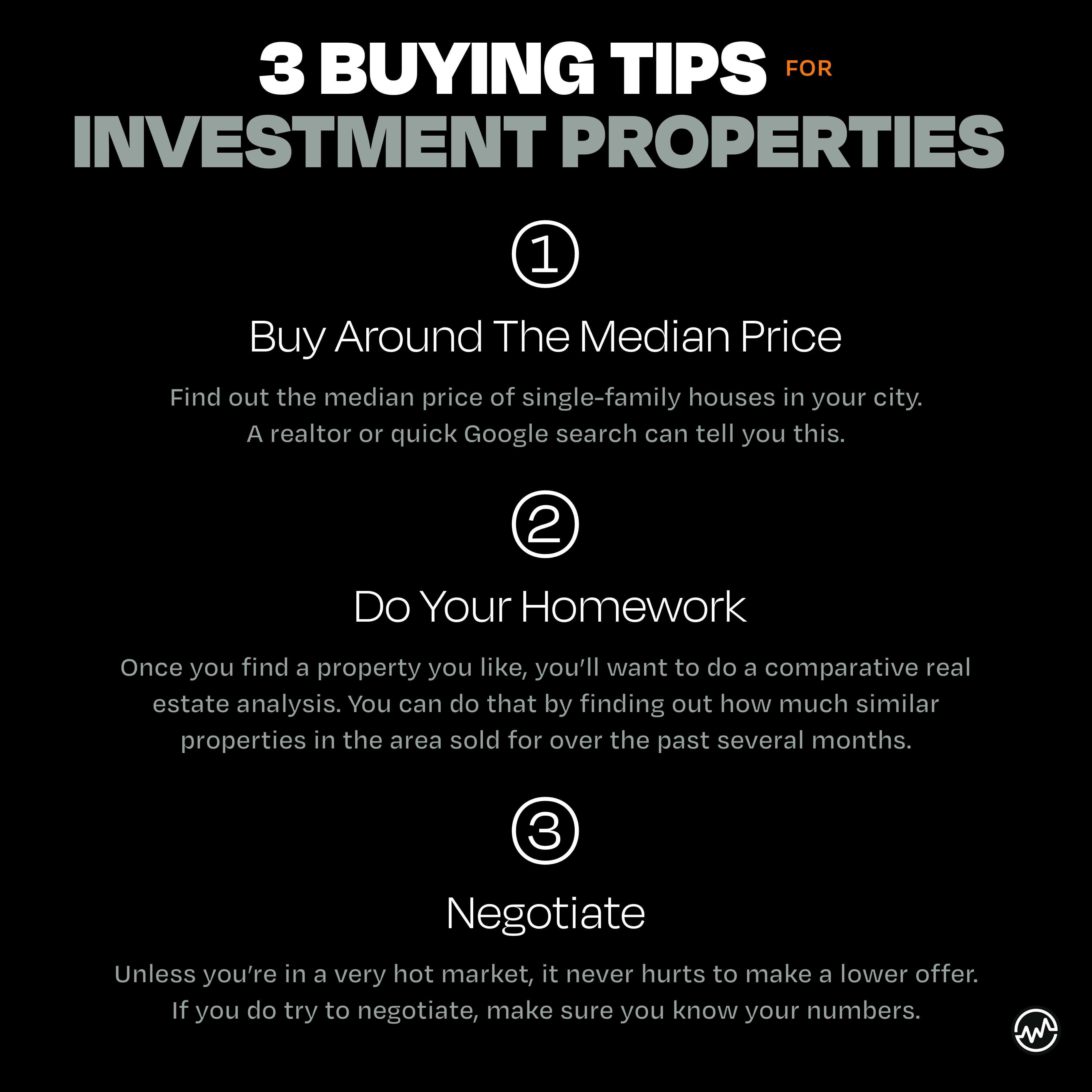
#1: Buy Around The Median Price
If you listed all the homes sold from least to most expensive, the median price is the one directly in the middle.
Find out the median price of single-family houses in your city. A realtor or quick Google search can tell you this.
Now, set your initial price range to include houses between 50% under the median to 25% over it.
Lower Than 50% of the Median
Any lower than 50% of the median, and you will probably be investing in high-crime areas that take a lot more time and stress to manage, and will require more cash for surprises like having your AC unit stolen overnight.
Higher than 25% of the Median
Any higher than 25% over median and your mortgage payment will probably be so high that your cash flow is weak.
Plus, it will be harder to find tenants willing to rent at a price that high instead of just buying themselves.
And, any missed payments will be more likely to destroy whatever cash flow you had this year.
#2: Do Your Homework
Once you find a property you like, you’ll want to do a comparative real estate analysis. You can do that by finding out how much similar properties in the area sold for over the past several months.
Ideally, you’ll be able to find homes with comparable square footage that are in the same zip code as the property you’re considering.
To make sure the comparisons are valid, look for homes that have about the same number of bedrooms and bathrooms.
Once you’ve identified several similar properties, take a look at their selling prices. These prices will give you a good idea of what you should be paying when you begin the negotiation process.
#3: Negotiate
People forget that house prices aren’t set in stone (for example, find out how to negotiate your mortgage rate here).
Unless you’re in a very hot market, it never hurts to make a lower offer. That being said, if you do try to negotiate, make sure you know your numbers.
You’ll want to be able to support the figure you’re offering with facts and statistics, rather than just a “gut feeling” that you should be paying less.
Also, be prepared to walk away from your investment property. You might have to.
Sometimes sellers are emotionally attached to their properties and aren’t willing to compromise. They also may have an unrealistic idea of what their home is worth, especially if it’s just gone on the market.
If a homeowner’s unwilling to consider your offer, hold off on purchasing. You can always touch base with them every couple of weeks to see if they’re willing to come back to the bargaining table.
While negotiating might seem like a pain, it’s definitely worth your time to hammer out a better price — especially when you consider the payoff.
For instance, negotiating gives you the opportunity to save as much as $5,000-10,000 —or even more. This in turn will lower the down payment also.
Speaking of which . . .
Saving For Your Down Payment
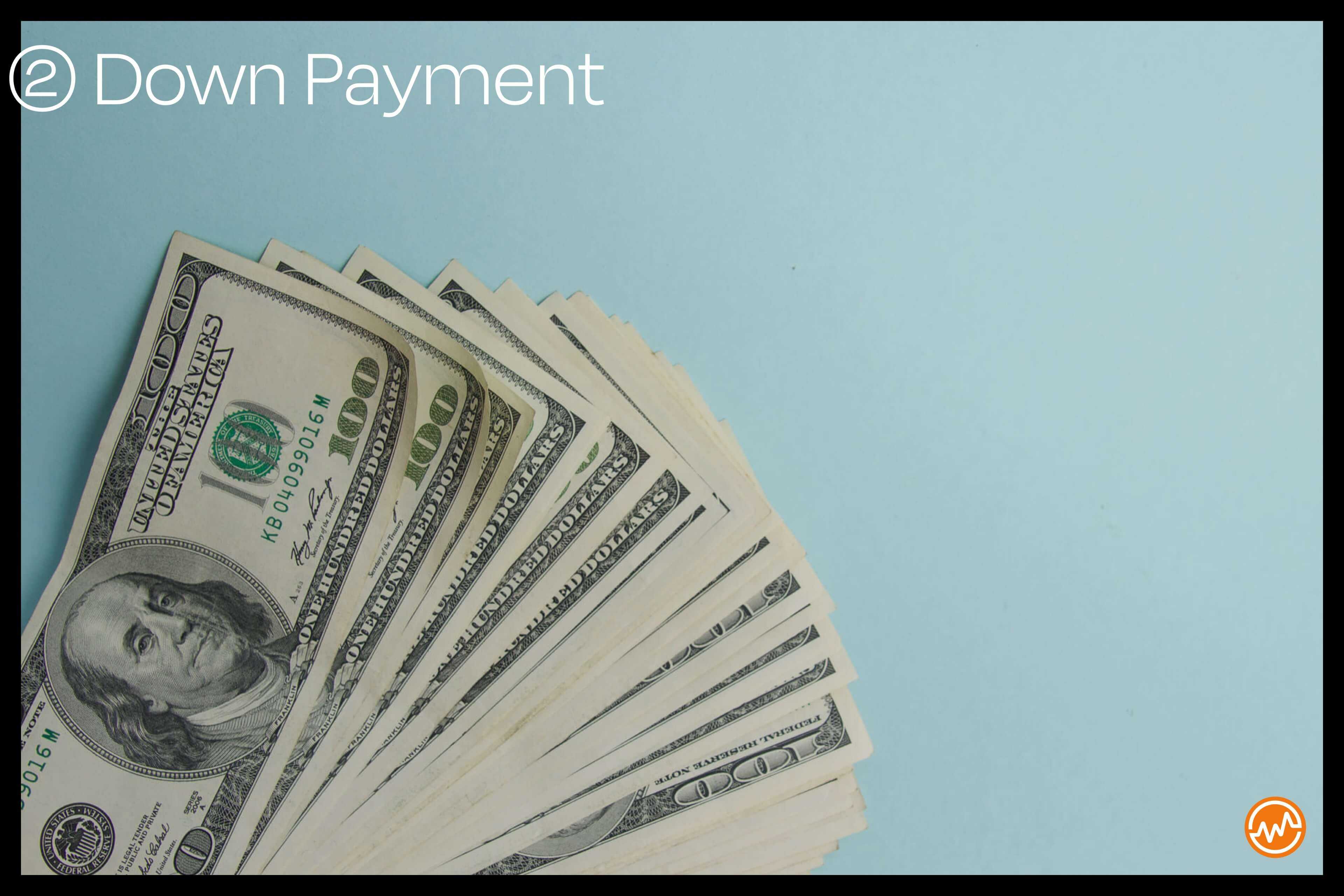
The next item on our list to answer the question “how much money do you need to invest in real estate: the down payment.
As with the purchase price, less is more. The more leverage you have when borrowing to buy your investment property, the less cash out of pocket is needed and the higher your cash-on-cash return.
To illustrate, which of the following two scenarios looks better to you when purchasing a $100,000 property and getting a loan with a 6.5% interest rate:
A) Put down $20,000 with mortgage payment of $505 and own one property.
B) Put down $10,000 with mortgage payment of $568, and have more money available to buy a second property?
If you guessed B, you’re correct! Did you notice the difference in mortgage payment was only $63/month?
You will pay a little more per month, but as long as your rental income covers the amount, then you’re now much closer to being able to repeat the process and have twice the benefits of property ownership.
Why Is ROI Important?
Because the sooner you get your investment back, the sooner you can buy another house, the sooner you can pay down the mortgage or the sooner you can live off the cash flow.
Cash gives you options.
Some people would choose the lower payment, but by doing so they are tying up all their cash in one house.
Personally, I would rather buy two houses and put $10,000 down on each than $20,000 on one house.
Either way, you’ll benefit from appreciation and suffer from depreciation.
But 30 years from now, would you rather have one free and clear house or two for the same amount of money invested?
Seems pretty simple to me. Buy in a market that is set for long-term, stable growth, and get as much leverage as you can.
Along those same lines, if you’re wondering how many mortgages you can have, you can find that answer right here.
“House Hacking”
The best way to do this is called “house hacking.” It means getting an owner-occupied loan (as low as 3.5% down with FHA) instead of a loan meant for real estate investors (usually 10%).
But don’t game the system! Follow the guidelines closely, which state that you must make the house your personal residence for at least one year.
Now, you might have to put off buying your dream home for a year to live in this one, but 12 months later you’ll have enough cash on hand to do it again because you didn’t tie it all up in one big down payment.
Some investors buy duplexes or fourplexes using FHA loans, then live in one unit while renting out the rest. The income from the other units offsets or even covers their own housing payment.
But, even if house hacking isn’t for you, just remember that less money down is usually better, and 10% down is still better than tying up 20% or more.
In addition to the down payment, you’ll have closing costs, to pay for title company fees, lender fees, loan escrows, first year’s insurance, a property inspection, and the deed preparation fee.
You can get what is called a Good Faith Estimate from your mortgage broker to find out a more specific idea for your location and loan type, but to get a rough idea expect it to be about 3.5% of the purchase price.
Estimating Repairs & Maintenance
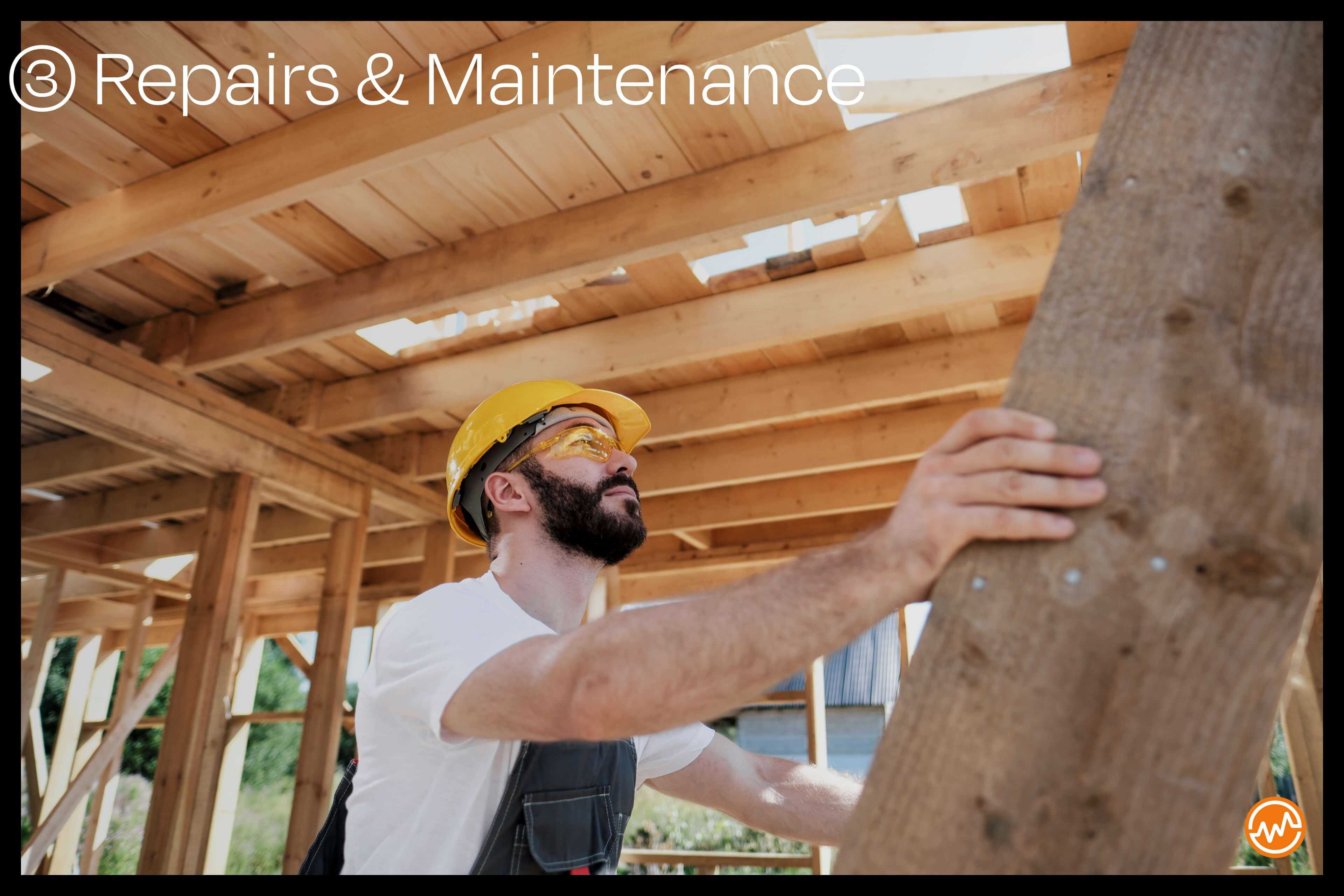
The third item on our list to answer the question “how much money do I need to invest in real estate”: estimating repairs and maintenance.
Here is where new investors get stuck . . . You’ve bought your first rental property, but the cash requirements don’t stop there.
It’s still going to take money to maintain the house and keep it in rentable condition.
How much this will cost depends on two things:
- The initial work needed to get it rentable
- The average annual maintenance costs
Work Required for Renting
Let’s talk about the first one. Is it a fixer-upper?
If so, you’ll need to factor in a repair budget for items like:
- paint
- carpet
- counters
- cabinets
- appliances
- anything else needed to make it liveable
If not, skip these costs.
The good news is it does NOT have to look as great as a house you’re trying to sell. Forget everything you saw on HGTV.
You can get away with linoleum counters instead of granite, white appliances instead of stainless steel, and paint over the old cabinets instead of installing fancy new ones.
You will rarely get your money back from making these extra investments, and if renters want the perfect house so badly they can go buy one.
You may also need to have cash for holding costs on hand, meaning enough to cover the mortgage payment, property insurance, and taxes for 1-2 months while you’re fixing it up and finding a new tenant.
Average Annual Maintenance Costs
The second costs to be aware of are the general maintenance costs.
Some things you’ll need to pay for every year, like cleaning the gutters or putting money away towards a new roof when the time comes.
These costs aren’t as urgent, but if you don’t take care of them now then you might find yourself paying more later on, or worst case being stuck with a house you can’t get rent!
I know a lot of this can sound very scary, especially if you’re not particularly handy.
So here are your two key people to lean on before you make your purchase:
Your Property Inspector
This will be required by your lender anyway, so read their report and talk to them afterward to make sure you understand all the things that need work now or later, in order of priority.
Your Handyman
Once you know which repairs are needed, get estimates from the people who could provide the services for you.
This will help you to know how much you’ll need now for urgent items, and every year on average for maintenance.
Saving Emergency Reserves
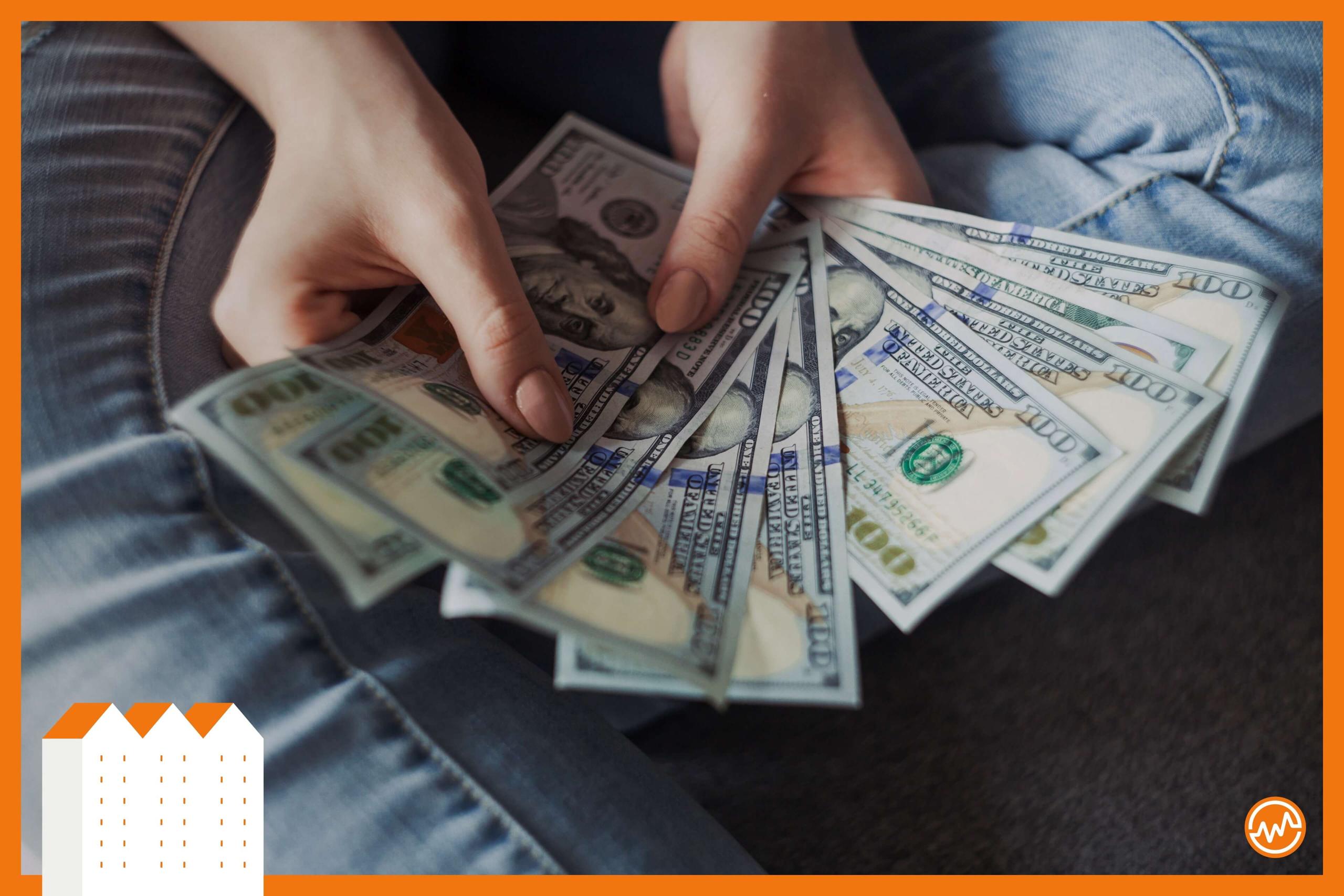
The last item to answer “how much money do you need to invest in real estate”: emergency reserves.
It’s important to factor in vacancies and other unexpected costs when buying a rental property.
While some landlords brag about having the same tenant for 13 years, the reality is that that’s not always the case; tenants move out from time to time.
And, until you replace them, it’s going to be you paying the mortgage, giving it a fresh coat of paint, and fixing any other items needed to get it in rentable shape again.
But, while some things are unforeseen, planning can go a long way.
You will have fewer repairs to make and retain tenants longer if you screen out bad applicants and take care of the ones you allow inside.
I’ll give you my rule of thumb for estimating reserves along with everything else at the end of this article, and then you’ll be able to tell exactly how much you’ll need to take the plunge.
Make sure to be conservative. It’s much better to overestimate your costs rather than underestimate them. overestimate your costs rather than underestimate them.
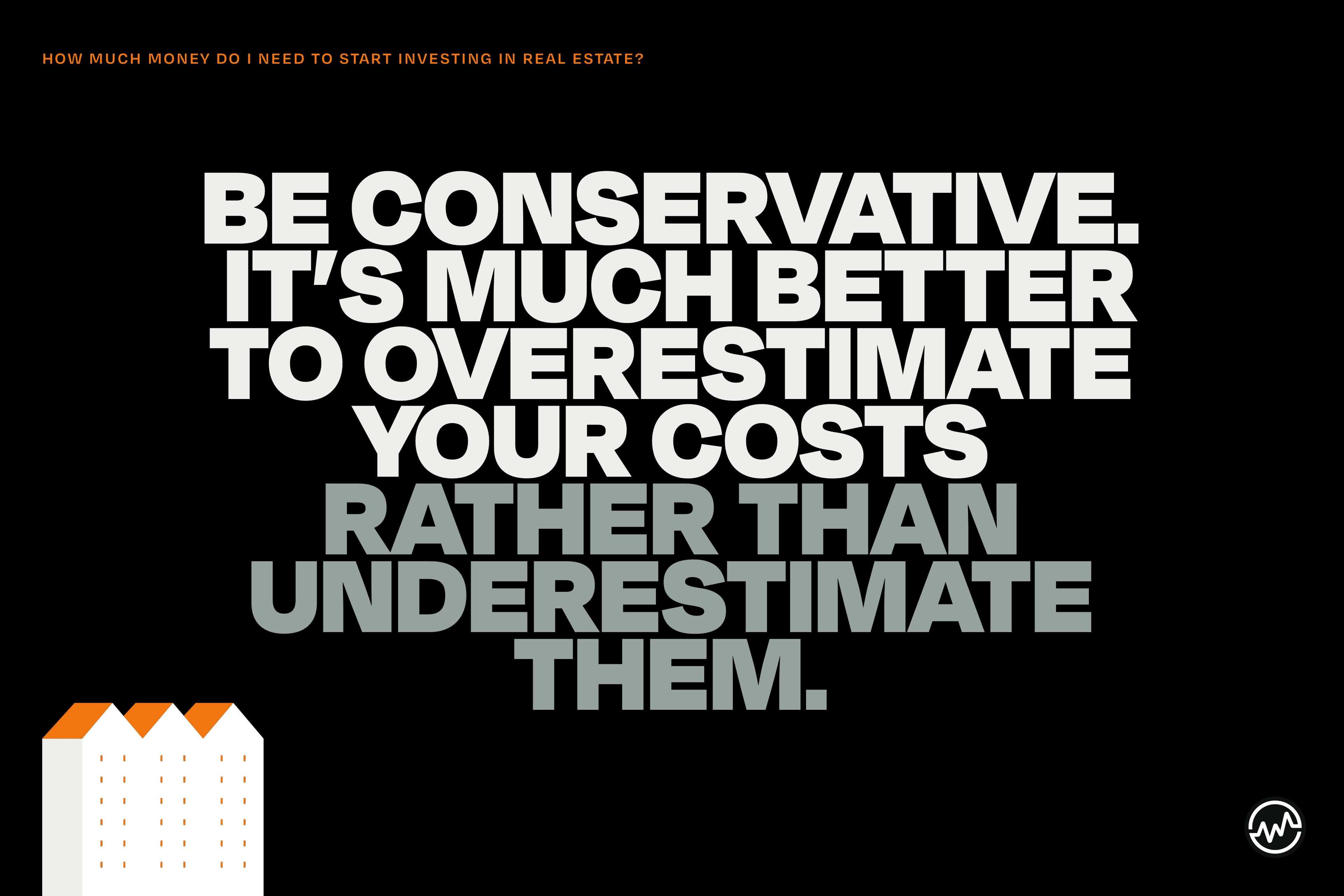
Remember that while the returns you can achieve with real estate can be substantial, it is an illiquid investment.
This means that your money is solidified inside the house with no way to get it out unless you refinance or sell.
If you feel like you have enough to buy a rental property but will need to skimp on repairs or reserves (or worse yet, pray for good luck), it’s better to put your emotions in check, pass on the deal, and continue to save until the time is right.
Cash Breakdown: How Much Do You Need For Your First Real Estate Investment?
So here’s the part you’ve been waiting for . . . how much money will I really need to buy an investment property?
Use this simple breakdown to come up with the right figure for you:
Down Payment
House hacking with an FHA loan 3.5%, regular investor loan 10%.
Closing Costs
Generally 3.5% of the purchase price.
Repairs
- $1.50 per square foot for paint
- $2.00 per square foot for carpet
- Anything else gets an estimate, but for a rough rule of thumb, figure on $5K-$10K if it needs cosmetic repairs.
Reserves
This includes 6 months of mortgage payments.
If you’re looking for ways to save money in order to create a reserve in this manner, here are a few ways to do so.
Getting Started
Now that you have the dollar amount all figured out, it’s time to take action!
Investing in real estate does not have to be a mystery or a dream to do “someday.”
Instead, it’s just a matter of time.
If you don’t have the cash on hand right now, then create a plan to have that cash. Maybe that’s:
You can also use an app like DealMachine to find distressed properties and wholesale them to cash buyers. Wholesaling is a great strategy to make the cash you need to reinvest into your first rental property.You can also use an app like DealMachine to find distressed properties and wholesale them to cash buyers. Wholesaling is a great strategy to make the cash you need to reinvest into your first rental property.DealMachine to find distressed properties and wholesale them to cash buyers. Wholesaling is a great strategy to make the cash you need to reinvest into your first rental property.
Your financial future isn’t going to just happen on its own. It’s going to take some sacrifices and massive action on your part. Make your plan, go for it, and stay determined!
Continued Learning: Real Estate Investing
Now that you know the answer the often asked question “how much money do you need to invest in real estate”, continue your real estate education with these free WealthFit resources:














